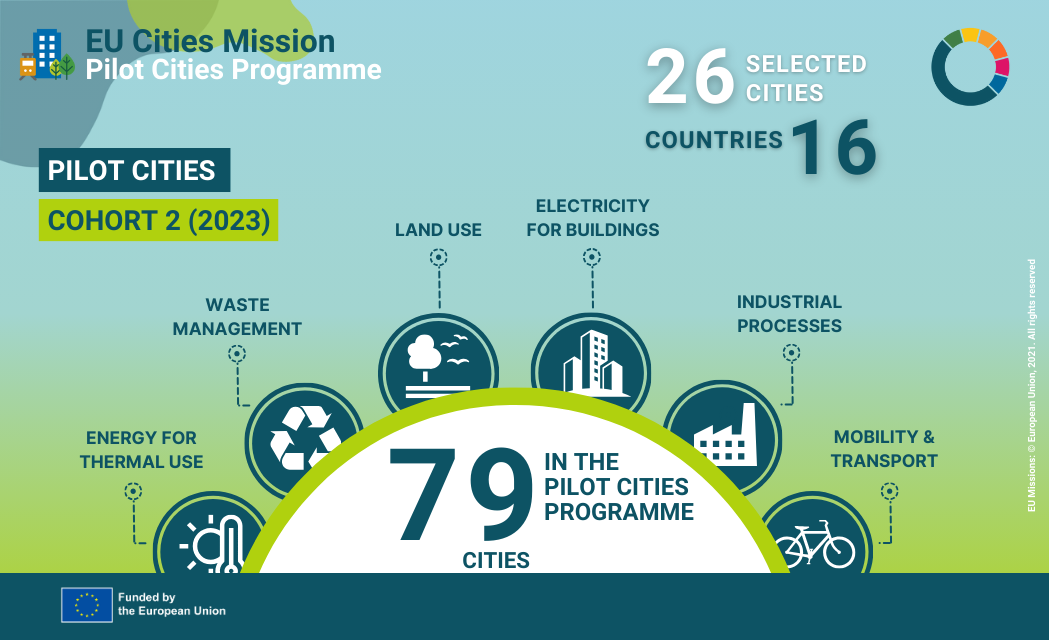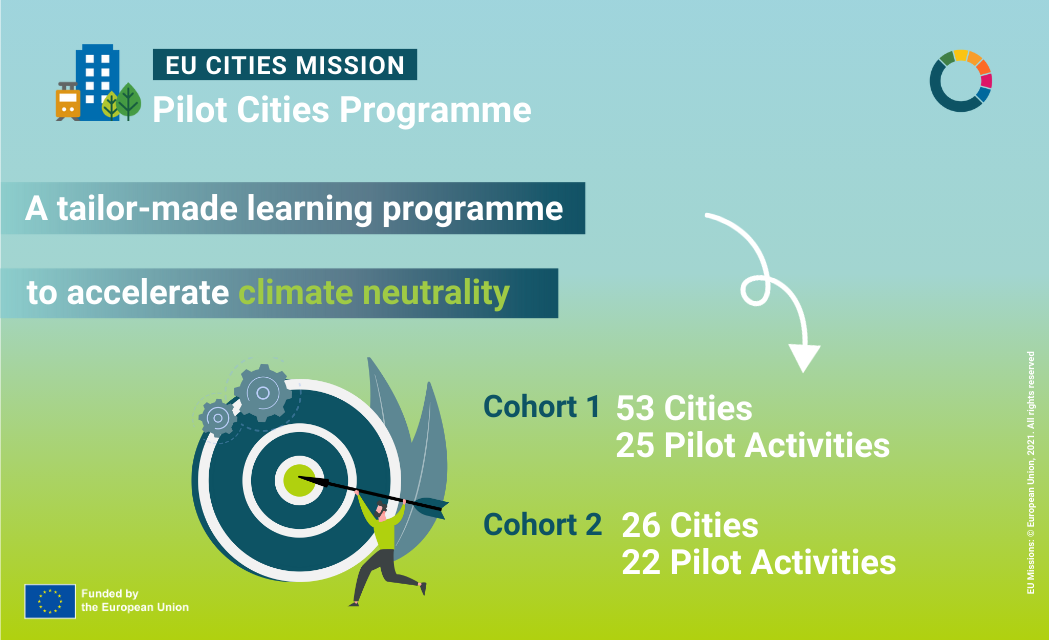Author: Elisa Abrantes
The Pilot Cities programme is set to scale up with a second cohort of 26 European cities. This brings the total number of participating municipalities to 79, all of which are working to develop innovative solutions for rapid decarbonisation. The third and final call to join the PCP is now open and will soon increase this number even further.
The goal of generating groundbreaking solutions is matched by a robust focus on learning within the Pilot Cities Programme. Particular emphasis is placed on collective learning entailing the pooling of diverse perspectives to create shared understandings. This collaborative approach allows complex situations to be examined from a multitude of perspectives, bringing strategic and actionable insights to the surface which cities can feed into their decision-making.

Learning how to orchestrate systems change
“There is a huge weight of expectation on the Cities Mission and the climate neutrality goal that cities have committed to. The Pilot Cities and their partners are stepping into a space which requires them to be vulnerable and collaborate on the basis of not knowing exactly what the way forward is. It takes a lot of courage to do that.” says Will Wade, NetZeroCities Pilot Cities Programme Orchestrator.
Different learning activities punctuate the two-year journey of Pilot Cities, intended to enable them to generate real-time insights as they go through the Programme and ultimately make their experiences scalable and replicable to others in pursuit of sustainable urban development.
Like the first cohort of 53 Pilot Cities selected in early 2023, the new 26 Pilot Cities will undergo an initial bootcamp, an intensive exploration and learning programme with expert input from NetZeroCities to build knowledge, capacities and trust. This will be followed by a round of collective sensemaking sessions. Site visits, peer learning, and a twinning programme constitute additional components of the learning process for cities involved.
This emphasis on learning caters to the complex nature of systems change. There are no predetermined solutions, so cities will need to learn how to navigate complex ecosystems to introduce systemic changes and successfully move towards a sustainable future.
“The urgency of achieving climate-neutrality, and the inherent difficulty in doing so, means that traditional methods of monitoring and evaluation carried out at the end of a project are ill-suited to the rapid innovation required. For this reason, the emphasis has been placed on consistent learning and reflecting throughout the Programme so cities can learn, react and continuously adapt their plans,” says Nikhil Chaudhary, Strategic Learning Lead in NetZeroCities.
Collaboration as a pathway for transition
One avenue for learning to happen is collective sensemaking sessions, where Pilot Cities are grouped based on commonalities in their plans. This is intended to maximise opportunities for peer-learning and tailored exchange.
In the first cohort, the projects of one group (Kozani, Liberec, Leuven, and Spanish cities) were based on improving energy efficiency in the built environment. Another group (Rivne, Slovenian and Italian cities) found they had challenges related to data governance in their cities, among other topics including finance and participation.
“While the initial sensemaking sessions might seem like we are scratching the surface, they are very much sowing the seeds for future sessions and future collaboration. We have seen in these early sessions that cities are identifying common challenges. This will hopefully be the beginning of a relationship and allow them to dive deeper in the next sessions”, says Anna Huttunen, Climate-Neutral City Advisor for NetZeroCities.
Early sessions have revealed shared challenges among cities, including the role of city administration, citizen involvement practices, and engaging different stakeholders with different needs and priorities.
“We are finding it challenging to move from a point where everyone is looking at each other, and mostly to the city administration, to take the first step to a place where everyone feels empowered to take ownership of the transition,” said one of the city representatives during a sensemaking session.

Though there are certainly local specificities, such as the political landscape, funding and resources and the level of autonomy cities have, many cities have realised that many of these challenges are common to them all.
In some cases, cities applied as teams, or multi-city Pilots. Spain and Sweden set up national platforms, independently of the Programme, to enable collaboration across transformational initiatives, making it easier to share knowledge and develop common approaches and increase their visibility to national governments.
“We know where we need to be in 2030 but we don’t know where we are right now,” was a resonating comment from a city representative in one of the sensemaking sessions.
Pilot Cities are embracing the challenge of not necessarily knowing what the right solutions are, and they are gearing up to learn together how to get there.
There is strength in numbers, and this second cohort of cities offers a wealth of new opportunities for meaningful collaboration and mutual learning.
Further information:
Pilot City Programme: https://netzerocities.eu/pilot-cities-programme/
1st cohort of Pilot Cities: https://netzerocities.eu/pilot-cities-cohort-1-2022/
2nd cohort of Pilot Cities: https://netzerocities.eu/pilot-cities-cohort-2-2023/
Apply to the 3rd cohort of the Pilot Cities Programme: https://netzerocities.eu/2024/01/16/netzerocities-call-for-pilot-cities-cohort-3-is-now-open/
European Commission’s Climate Neutral and Smart Cities Mission





